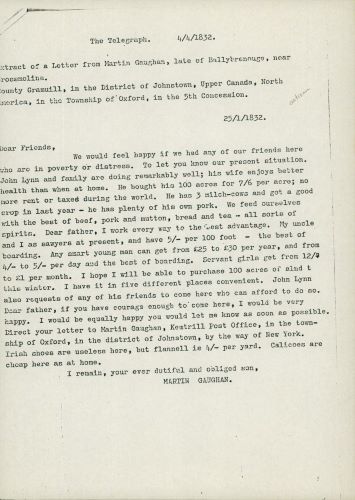I am always amazed at how popular family history is in Canada. Library and Archives Canada reports that fully 90% of visitors to their facility are researching family history. Genealogy is a major interest for Canadians because we all come from somewhere else, originally (including Indigenous peoples). A very large percentage of immigrants to Canada, especially Ontario eastwards, came from Ireland in the Nineteenth Century, and Irish genealogical records are a major source of information for those tracing their roots there.
Unfortunately, until recently those sources have been scarce, largely because of the destruction of the Public Records Office in Dublin in 1921, in which records from as far back as the Eleventh Century were lost. But two new projects have come as a tremendous aid to tracing your Irish ancestors.
A century after those precious records were lost, a project to restore them from many outside sources was launched. Supported by a €2.5 million grant from the Irish government and employing 14 full‑time archivists, Beyond 2022: Ireland’s Virtual Record Treasury, a searchable database, a selection of curated stories, as well as a 3D virtual‑reality recreation of the archive building itself as it would have looked in the days before the fire, has been put online for researchers to use. The material is composed of copies located in more than 70 archives around the world, and damaged documents restored using AI technology, and consists of more than 150,000 records and more than 6,000 maps dating from 1174 to 1922. Included in the collection is a religious census dating from 1766, an invaluable resource.
Beyond 2022: Ireland’s Virtual Record Treasury is available online for genealogists and historians.
Another new source is located at the University of Galway, and also available online free of charge. It consists of a collection of more than 7,000 letters sent to and from Irish immigrants to North America over 400 years. They were gathered over sixty years by Kirby Miller, a prominent Irish-American historian, who donated them to the University of Galway on condition they be digitised and transcribed, to be made freely available to the public.
A brief browse through the collection revealed the transcript of a letter written by a settler in Oxford-on-Rideau Township in 1832 to his family in Crossmolina in County Mayo. Sent from the Kemptville Post Office, it gives details on the life of the immigrant, the cost of land and the standard of life compared to back home.
These sources for genealogy are a really important, and unexpected, new asset to those looking to trace their Irish ancestors, and something to be grateful for on this season of St. Patrick.

